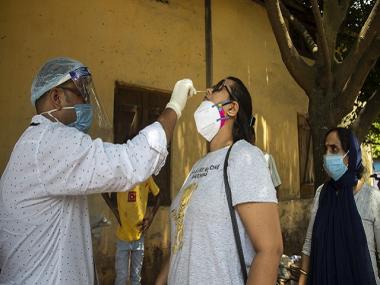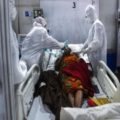As India saw the lowest rise in daily COVID-19 cases after a gap of 25 days on Sunday, with 3.11 lakh new cases being reported, Delhi, Punjab, Haryana and Jammu and Kashmir extended lockdown restrictions in a bid to curb the COVID-19 spread.
A total of 3,11,170 new cases were reported in a day, taking India’s COVID-19 caseload to 2,46,84,077, the Union health ministry said. The last time the country recorded a low single-day spike in new cases was on 21 April, when 2,95,041 new cases were reported.
Nine days later, on 30 April, India became the first country to report more than 4 lakh daily cases since the pandemic began in 2020.
On Sunday, Delhi chief minister Arvind Kejriwal announced that the lockdown will be extended for the fourth time till 24 May.
Making the announcement, he said, “We have been witnessing good recovery following the lockdown. coronavirus cases have been on a decline. We don’t want to lose the gain that we have made in the last few days. We are extending the lockdown for one more week. Instead of tomorrow, lockdown is extended till next Monday, 5 am in Delhi.”
The restrictions imposed under the lockdown, including suspension of metro train services, will remain in force till morning on 24 May.
“There is no relaxation as of now and all the restrictions that were enforced in this week will continue,” Kejriwal added, stating that the positivity rate in Delhi has further reduced to nearly 10 percent.
The lockdown was also extended till 24 May in Haryana and Jammu and Kashmir, while the Punjab government extended the restrictions till 31 May.
Additionally, Maharashtra, Kerala, Jharkhand, Chhattisgarh and Haryana were among the states that have reported some improvement in terms of daily COVID cases, though the death toll remains a cause of concern, PTI reported.
Meanwhile, Congress leader and Rajya Sabha MP Rajeev Satav died on Sunday, days after recovering from coronavirus, PTI reported. Satav (46) was undergoing treatment at a private hospital in Pune after testing coronavirus positive last month, and was on ventilator support.
A media release by the Jehangir Hospital said Satav succumbed to “secondary pneumonia with multi-organ dysfunction syndrome” around 5 am. He had become “RT-PCR swab negative” on 9 May, it added.
On the vaccine front, Hyderabad-based Bharat Biotech on Sunday said its COVID-19 vaccine ‘Covaxin’ has been found to be effective against coronavirus strains found in India and the UK.
Citing a study published in peer-reviewed medical journal Clinical Infectious Diseases, the vaccine manufacturer noted that vaccination with Covaxin produced neutralising titres against all key emerging variants tested, including B.1.617 and B.1.1.7, first identified in India and the UK, respectively.
Also on Sunday, the Union health ministry clarified that already booked online appointments for second dose of Covishield vaccine will remain valid and the same will not be cancelled on Co-WIN platform, reported PTI.
It, however, said requisite changes have now been done in the Co-WIN digital portal, as a result of which further online or on-site appointments will not be possible if the period after first dose date for a beneficiary is less than 84 days.
The Centre had on 13 May extended the gap between the first and second doses of Covishield vaccine to 12-16 weeks based on the recommendations by the COVID Working Group chaired by NK Arora.
The clarification comes amid reports suggesting that people who had pre-booked their appointment for the second dose in less than 84 days on CoWIN are being turned back from vaccination centres without getting the second dose of Covishield, reported Live Mint.
‘No new virus strain behind spate of COVID-19 deaths in AMU’
The Aligarh Muslim University (AMU), which has flagged a high number of COVID-19 deaths among its faculty and non-teaching staff, was told by officials that genome sequencing of COVID-19 samples has not found any evidence pointing to a new strain circulating on the AMU campus.
At least 38 AMU teachers including 17 serving ones, have died of COVID-19 or COVID-like symptoms in the last month, triggering doubts if any new deadly strain of the virus has been in circulation on the campus.
These doubts also prompted the varsity’s JNMC authorities to send COVID-19 samples from the AMU campus and its neighbouring Civil Lines area for genome sequencing to the CSIR-Institute of Genomics and Integrative Biology in New Delhi.
“No new strain of coronavirus has been detected in samples sent for genome sequencing to the CSIR in New Delhi,” said a senior JNMC official, in a relief to the hospital’s beleaguered staff who have been on the edge following a large number of deaths of the serving and retired AMU employees.
India’s COVID-19 active caseload decreases by 55,344 in 24 hours
India’s COVID-19 active cases count has decreased to 36,18,458 with a net decline of 55,344 cases being recorded in the active caseload in a span of 24 hours. The daily positivity rate dropped to 16.98 percent, the Union health ministry said on Sunday.
The total active caseload now comprises 14.66 percent of the country’s total infections, it said.
Ten states — Karnataka, Maharashtra, Kerala, Rajasthan, Tamil Nadu, Andhra Pradesh, Uttar Pradesh, West Bengal, Gujarat and Chhattisgarh — cumulatively account for 74.69 percent of the country’s total active cases, the ministry said.
A declining trend in the positivity rate is also observed which has dropped to 16.98 percent (16 May) from 24.47 percent recorded on 3 May, it said.
India’s cumulative recoveries have reached 2,07,95,335 with 3,62,437 patients recuperating in a span of 24 hours. It outnumbers the country’s daily COVID-19 cases for the fifth time in the last six days, the ministry said.
Ten states account for 70.94 percent of the new recoveries.
The ministry noted that Karnataka, Maharashtra, Tamil Nadu, Kerala, Andhra Pradesh, West Bengal, Rajasthan, Uttar Pradesh, Odisha and Haryana reported 74.7 percent of the 3,11,170 new cases registered in a span of 24 hours.
Karnataka has reported the highest daily new cases at 41,664 followed by Maharashtra with 34,848 cases and Tamil Nadu with 33,658 new cases. The national mortality rate currently stands at 1.09 percent.
BMC shifts 580 COVID-19 patients in view of Cyclone Tauktae warning
The Brihanmumbai Municipal Corporation shifted 580 patients from Covid care centres in the city as a precautionary measure after India Meteorological Department warned that Cyclone Tauktae is likely to pass close to the city.
The BMC on Saturday night shifted 580 patients from BKC (243), Dahisar (183) and Mulund (154) jumbo Covid care facilities to state and civic-run hospitals in Mumbai.
The BMC had alerted city hospitals to avoid last-minute confusion over beds and availability of oxygen devices.
COVID-19 caseload details
With 3.11 lakh fresh coronavirus infections, India saw the lowest rise in daily COVID-19 cases after a gap of 25 days, while the death toll rose to 2,70,284 with 4,077 new fatalities, according to the Union Health Ministry data updated on Sunday.
A total of 3,11,170 new cases were reported in a day, taking India’s total tally of COVID-19 cases to 2,46,84,077.
A total of 2,95,041 cases were reported in a span of 24 hours on 21 April.
The active cases have reduced to 36,18,458 comprising 14.66 percent of the total infections, while the national COVID-19 recovery rate has improved to 84.25 percent, the data updated at 8 am showed.
The number of people who have recuperated from the disease surged to 2,07,95,335, while the case fatality rate was recorded at 1.09 percent, the data stated.
According to the ICMR, 31,48,50,143 samples have been tested up to May 15 with 18,32,950 samples being tested on Saturday.
The 4,077 new fatalities include 960 from Maharashtra, 349 from Karnataka, 337 from Delhi, 303 from Tamil Nadu, 281 from Uttar Pradesh, 216 from Punjab, 197 from Uttarakhand, 149 from Rajasthan, 144 each from Haryana and West Bengal, 129 from Chhattisgarh.
A total of 2,70,284 deaths have been reported so far in the country including 80,512 from Maharashtra, 21,434 from Karnataka, 21244 from Delhi, 17,359 from Tamil Nadu, 17,238 from Uttar Pradesh, 13,137 from West Bengal, 11,693 from Punjab and 11,590 from Chhattisgarh.
With inputs from PTI
Health


